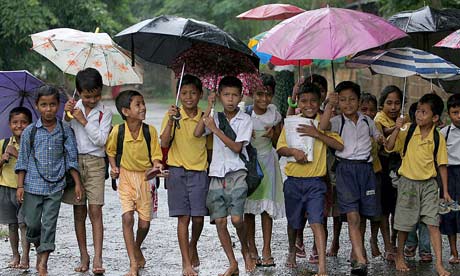Partha Sarathi Misra is helping teachers in state primary schools in India to overcome their frustrations as they struggle to speak English
Partha Sarathi Misra  Schoolchildren carry umbrellas as they walk home through a monsoon in Dadara, Assam. Photograph: STRDEL/AFP/Getty What keeps you motivated? I have been teaching English to teachers in state primary schools in Assam, India, since 1994. Their first language is Assamese, they can read and write English with varying degrees of proficiency, but most lack listening and speaking skills. The magnitude of the problem keeps me motivated.
Schoolchildren carry umbrellas as they walk home through a monsoon in Dadara, Assam. Photograph: STRDEL/AFP/Getty What keeps you motivated? I have been teaching English to teachers in state primary schools in Assam, India, since 1994. Their first language is Assamese, they can read and write English with varying degrees of proficiency, but most lack listening and speaking skills. The magnitude of the problem keeps me motivated.Best teaching moment? When trainees communicate in English independently. The training starts with a week of frustration as participants struggle to express anything in English. Ice starts melting from the second week. In the third, they manage isolated expressions. By the fourth they are speaking among themselves. When these adults experiment with English, just as children do with new toys, I feel happy.
And worst? De-culturalising ELT textbooks. Some teachers like to discuss the meaning of words such as "Boxing Day" or "hamburger" – in their first language.
What have you learned? Keep the teacher-trainer interference to a minimum. Trainees learn best when there is group solidarity.
Biggest challenge? The number of teachers who are yet to be trained. I am sceptical about the cascade model of teacher training – the transmission loss is too high. India's vast numbers of teachers will all need to be re-taught English listening, speaking, reading and writing skills. Two- or three-day training programmes in ELT for thousands of teachers may have publicity value, but pedagogically they are irrelevant. Primary teachers are asked to teach a language that they themselves did not learn well. Teach them English, don't train them as if they are robots.
What's next? The positive attitude of the younger generation of teachers in Assam makes me hopeful. They have started organising "English speaking clubs" to improve their skills, which I am helping to promote.
Top tip? Make exposure to the target language as unobtrusive as possible. We learn a language when we are not aware that we are learning it.
Dr Partha Sarathi Misra, 60, is director of the English Language Teaching Institute, Assam